
Telco-AIX
Various Telco AI Usecases & Experiments
Stars: 155
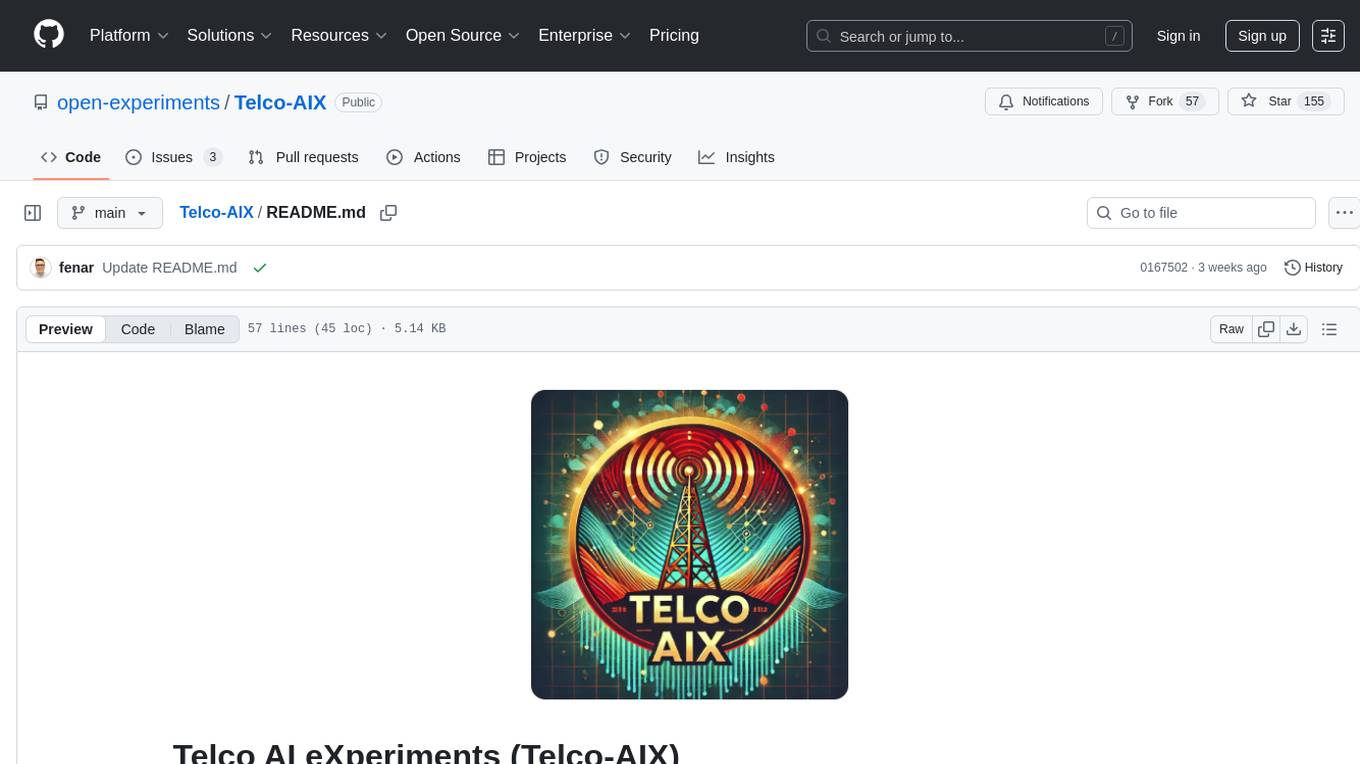
Telco-AIX is a collaborative experimental workspace focusing on data-driven decision-making through open-source AI capabilities and open datasets. It covers various domains such as revenue management, service quality, network operations, sustainability, security, smart infrastructure, IoT security, advanced AI, customer experience, anomaly detection, connectivity, network operations, IT management, and agentic Telco-AI. The repository provides models, datasets, and published works related to telecommunications AI applications.
README:
Welcome to the Telco-AIX collaborative experimental workspace –> where we explore data-driven decision-making through open-source AI capabilities and open datasets.
| Domain | Project | Focus Area |
|---|---|---|
| 💰 Revenue Management | RAFM | Revenue Assurance & Fraud Detection |
| 📊 Service Quality |
Service Assurance Churn Prediction |
Latency & NPS Predictions & Churn Predictions |
| 🌐 Network Operations | 5G Network Ops | Fault Predictions |
| 🌿 Sustainability | Energy Efficiency | Green Telecom Initiatives |
| 🔒 Security | SecOps-AI | Networking Security |
| ⚡ Smart Infrastructure | AI Powered SmartGrid | Grid Optimization |
| 🛡️ IoT Security | IoT Perimeter Security | Perimeter Security |
| 🤖 Advanced AI | 5G CNF RCA with LLM | Root Cause Analysis |
| 💬 Customer Experience |
CRM Voice App Intent Classification |
Intelligent Customer Interactions |
| 🔍 Anomaly Detection | RootCause Analysis | Model Chaining & RAG |
| 🛰️ Connectivity | Starlink QoE | Satellite ISP Experience |
| 🖥️ Network Operations | NoC AI Augmentation | OSS Optimization |
| 🎩 IT Management | ITSM Automation | Intelligent Service Management |
| 🤖 Agentic Telco-AI |
Agentic Framework Autonomous 5G Network |
Agentic Telco |
Explore our curated models and datasets: Telco-AIX on HuggingFace
| Title | Platform | Link | Key Authors |
|---|---|---|---|
| The AI Engine | Medium | Read Article | Tushar Katarki, Fatih E. Nar, William Caban |
| Lessons Learned from a Telco MCP BackEnd Experiments | Medium | Read Article | Ian Hood, Robert Shaw, Fatih E. Nar |
| Satisfaction is All You Need! | Medium | Read Article | Fatih E. Nar, Ian Hood, Ranny Haiby et al. |
| Artificially Intelligent Platform Interface (AI-PI) | Medium | Read Article | Fatih E. Nar, Ian Hood, Shujaur Mufti et al. |
| TrueAI4Telco | Medium | Read Article | Azhar Sayeed, Fatih E. NAR et al. |
| AI Accelerators' Performance vs Sustainability | Medium | Read Article | Fatih E. NAR |
| Avoid AI Blindness | Medium | Read Article | Arun Thomas, Fatih E. NAR |
| AI for Network Scalability | YouTube | Watch Interview | Fatih E. NAR |
| Integrating Gen AI in Networks | Vimeo | Watch Panel | Fatih E. NAR |
| GenAI in Telcos | Fierce Network | Read Article | Vinodhkumar Raghunathan, Fatih E. NAR |
| BERT Model Training | Red Hat Developers | Read Article | Alessandro Arrichiello |
| ITSM Automation | Red Hat Developers | Read Article | Alessandro Arrichiello |
🌟 Join Our AI Revolution in Telecommunications!
Interested in cutting-edge AI applications for telecom? Reach out, collaborate, and help shape the future of intelligent networking.
For Tasks:
Click tags to check more tools for each tasksFor Jobs:
Alternative AI tools for Telco-AIX
Similar Open Source Tools

Telco-AIX
Telco-AIX is a collaborative experimental workspace focusing on data-driven decision-making through open-source AI capabilities and open datasets. It covers various domains such as revenue management, service quality, network operations, sustainability, security, smart infrastructure, IoT security, advanced AI, customer experience, anomaly detection, connectivity, network operations, IT management, and agentic Telco-AI. The repository provides models, datasets, and published works related to telecommunications AI applications.
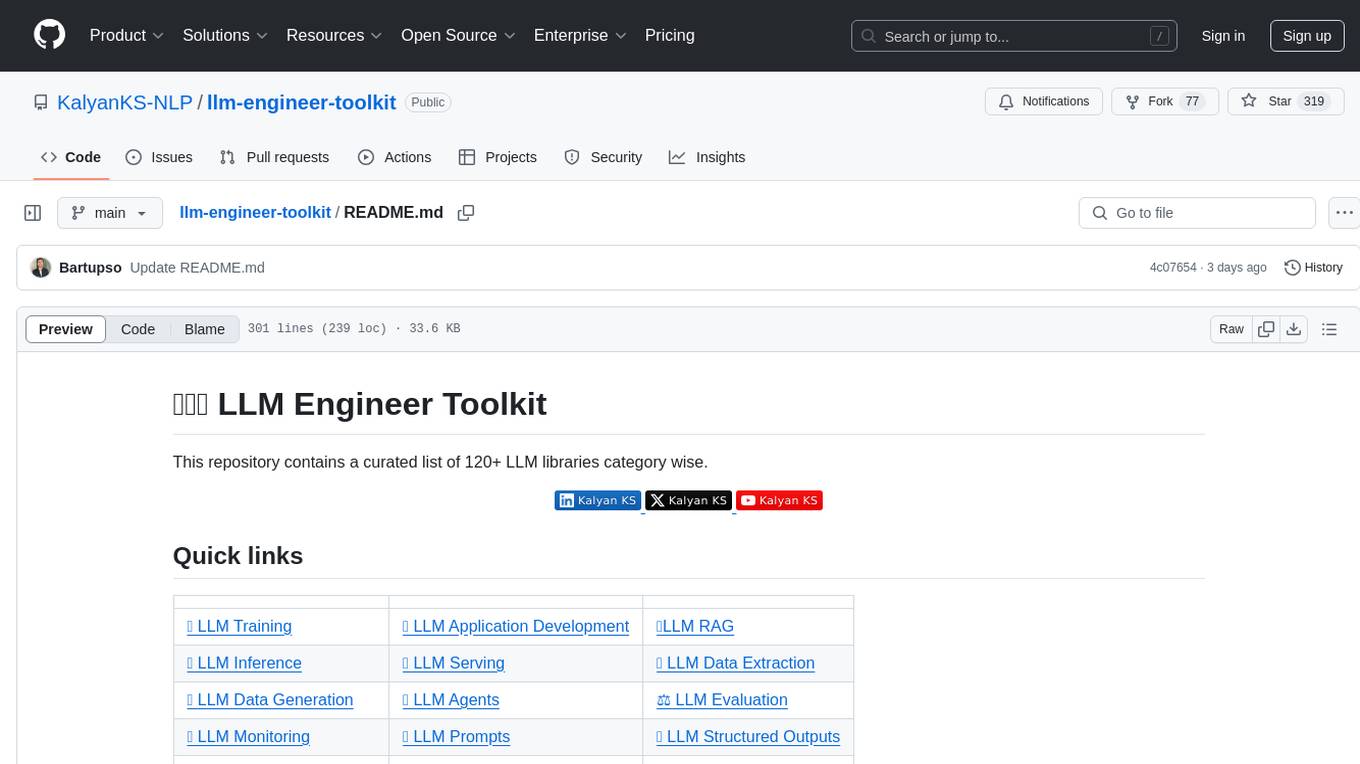
llm-engineer-toolkit
The LLM Engineer Toolkit is a curated repository containing over 120 LLM libraries categorized for various tasks such as training, application development, inference, serving, data extraction, data generation, agents, evaluation, monitoring, prompts, structured outputs, safety, security, embedding models, and other miscellaneous tools. It includes libraries for fine-tuning LLMs, building applications powered by LLMs, serving LLM models, extracting data, generating synthetic data, creating AI agents, evaluating LLM applications, monitoring LLM performance, optimizing prompts, handling structured outputs, ensuring safety and security, embedding models, and more. The toolkit covers a wide range of tools and frameworks to streamline the development, deployment, and optimization of large language models.
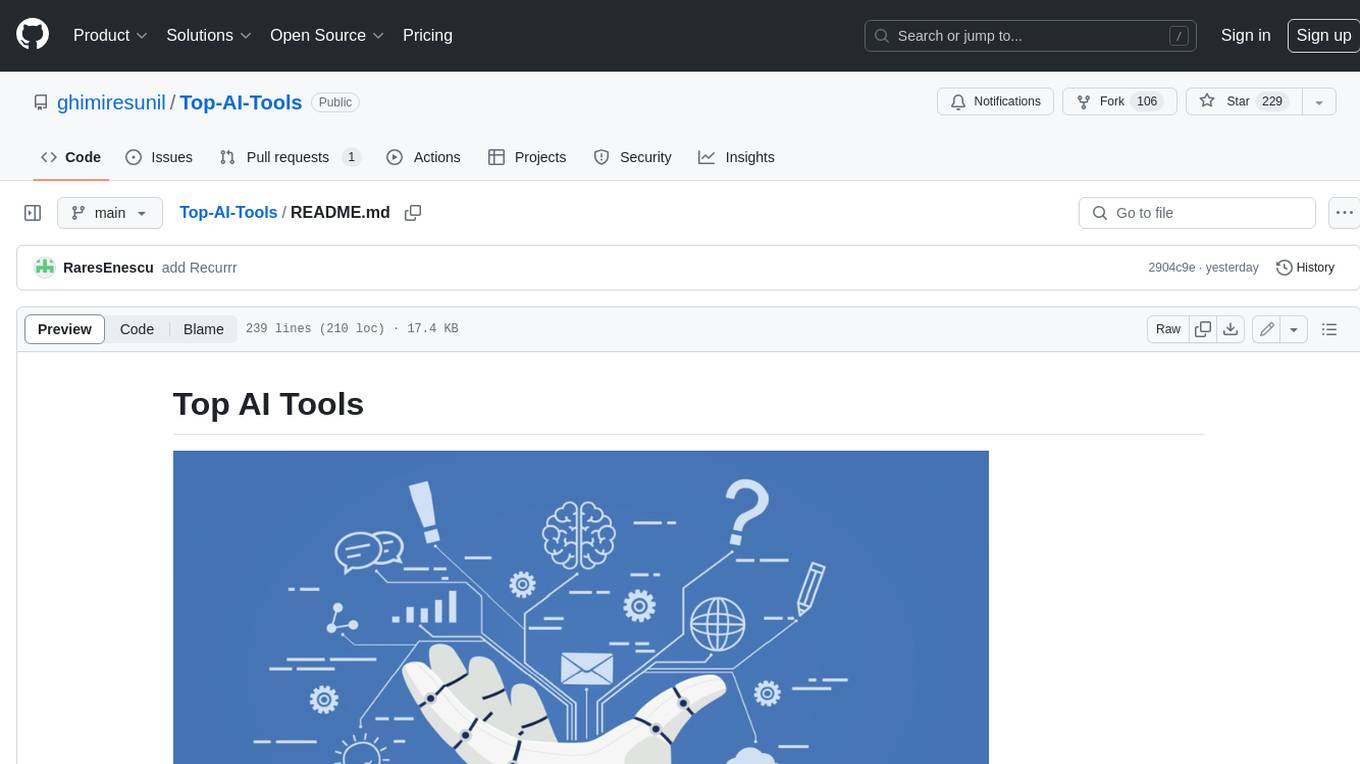
Top-AI-Tools
Top AI Tools is a comprehensive, community-curated directory that aims to catalog and showcase the most outstanding AI-powered products. This index is not exhaustive, but rather a compilation of our research and contributions from the community.
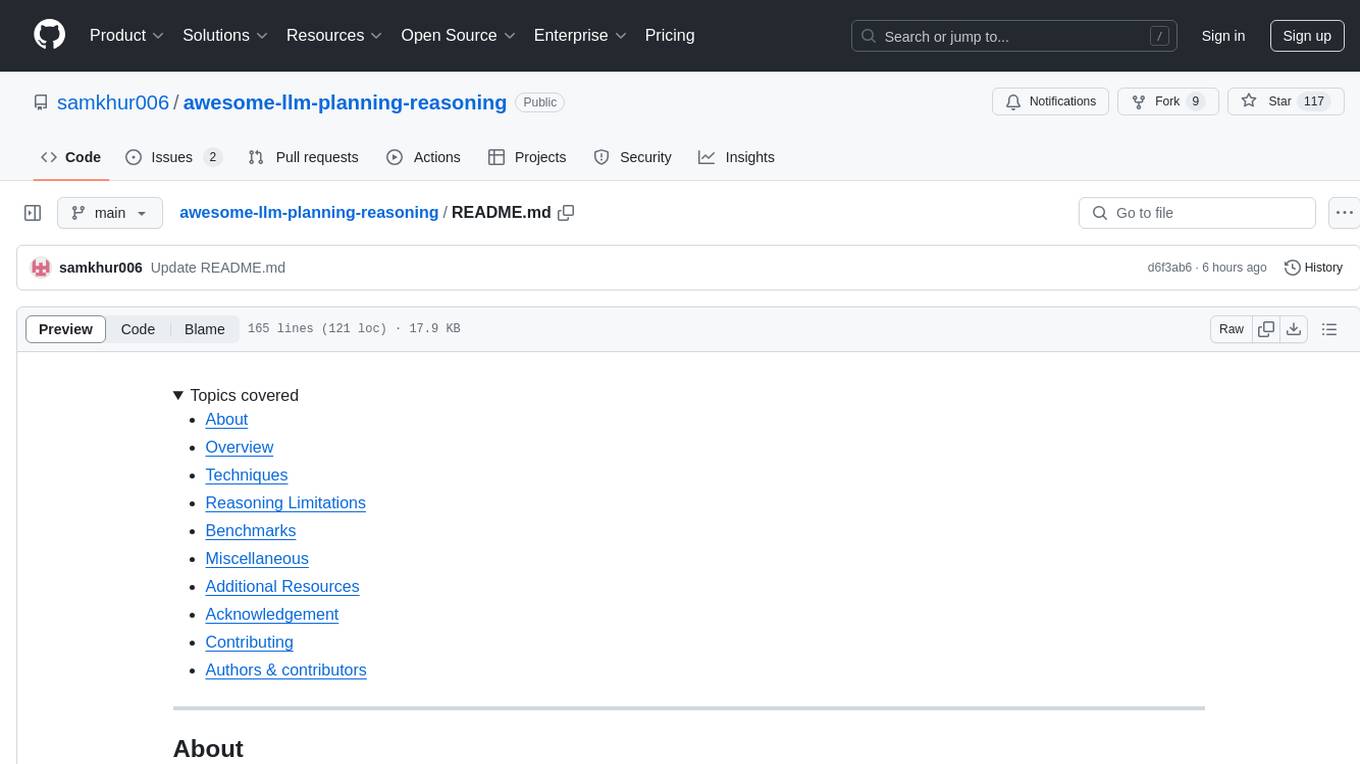
awesome-llm-planning-reasoning
The 'Awesome LLMs Planning Reasoning' repository is a curated collection focusing on exploring the capabilities of Large Language Models (LLMs) in planning and reasoning tasks. It includes research papers, code repositories, and benchmarks that delve into innovative techniques, reasoning limitations, and standardized evaluations related to LLMs' performance in complex cognitive tasks. The repository serves as a comprehensive resource for researchers, developers, and enthusiasts interested in understanding the advancements and challenges in leveraging LLMs for planning and reasoning in real-world scenarios.
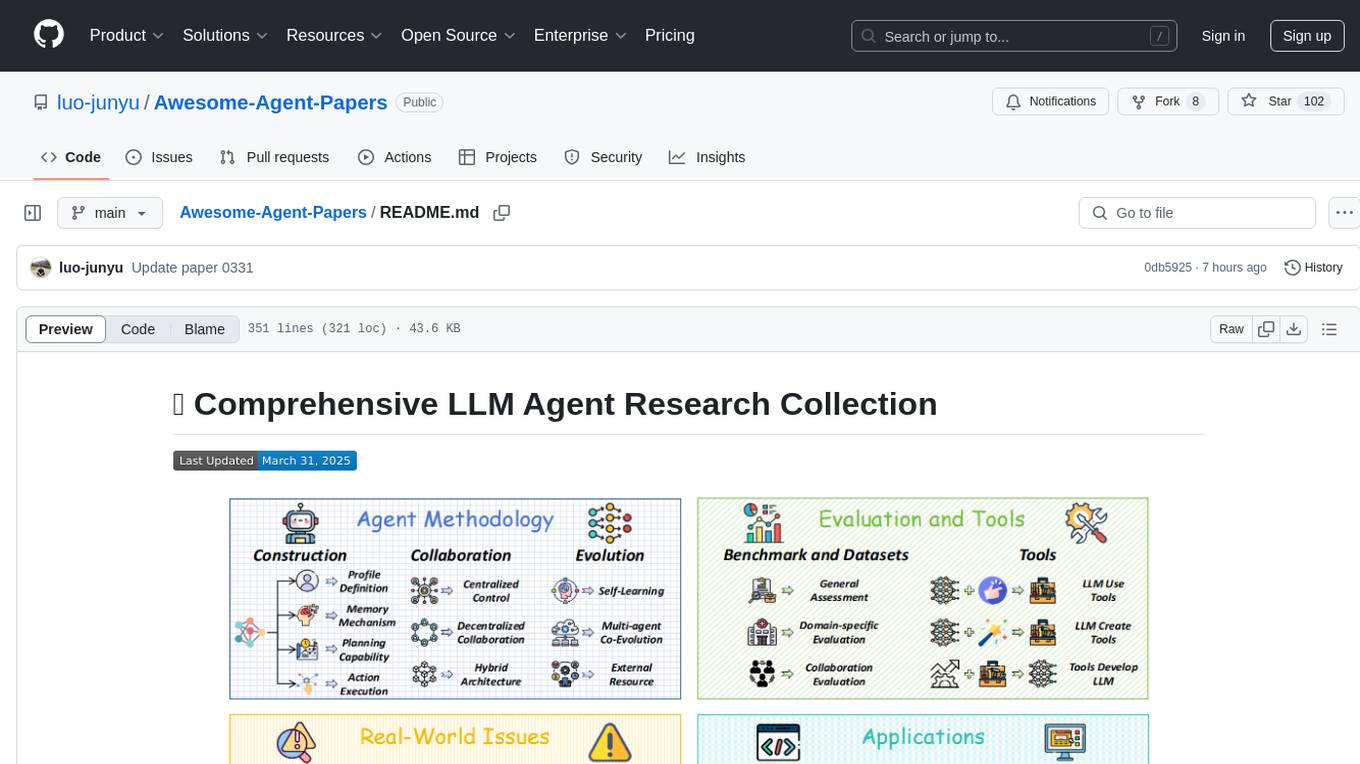
Awesome-Agent-Papers
This repository is a comprehensive collection of research papers on Large Language Model (LLM) agents, organized across key categories including agent construction, collaboration mechanisms, evolution, tools, security, benchmarks, and applications. The taxonomy provides a structured framework for understanding the field of LLM agents, bridging fragmented research threads by highlighting connections between agent design principles and emergent behaviors.
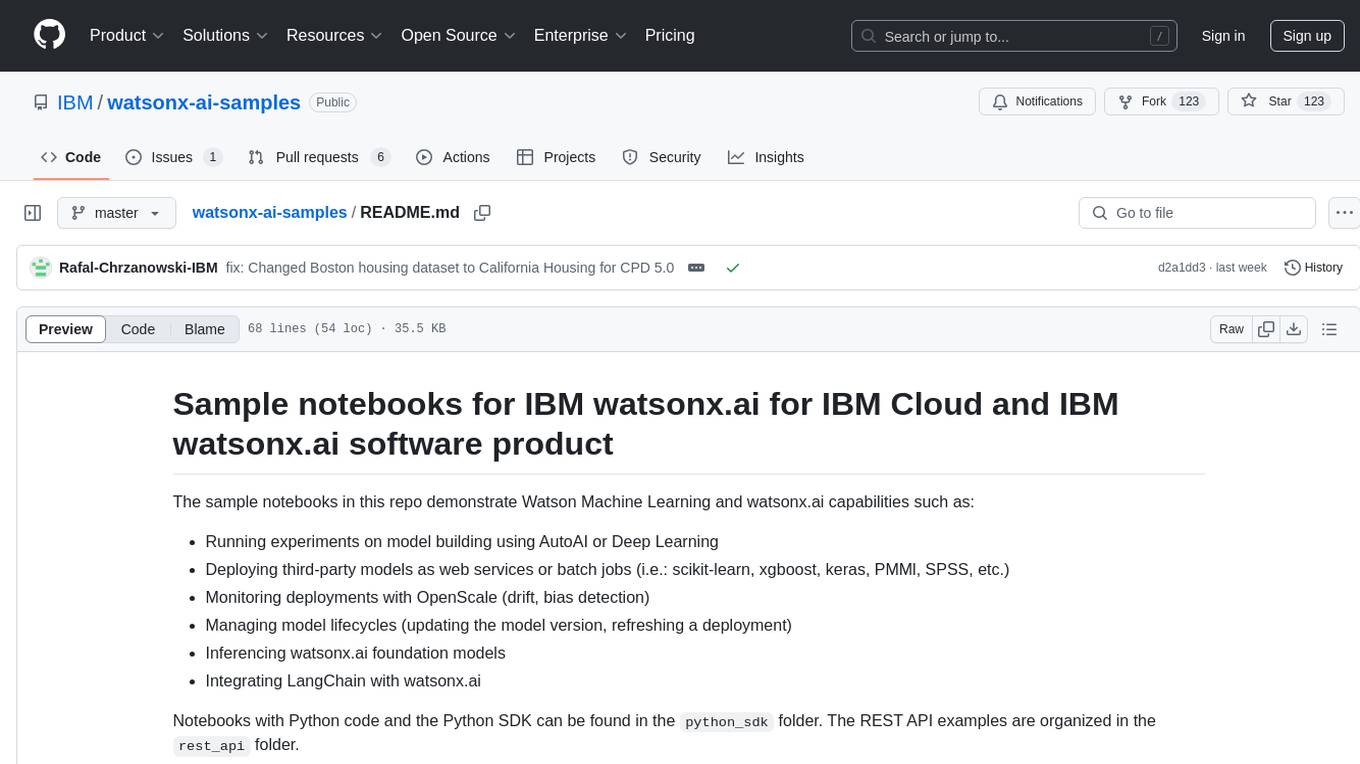
watsonx-ai-samples
Sample notebooks for IBM Watsonx.ai for IBM Cloud and IBM Watsonx.ai software product. The notebooks demonstrate capabilities such as running experiments on model building using AutoAI or Deep Learning, deploying third-party models as web services or batch jobs, monitoring deployments with OpenScale, managing model lifecycles, inferencing Watsonx.ai foundation models, and integrating LangChain with Watsonx.ai. Notebooks with Python code and the Python SDK can be found in the `python_sdk` folder. The REST API examples are organized in the `rest_api` folder.
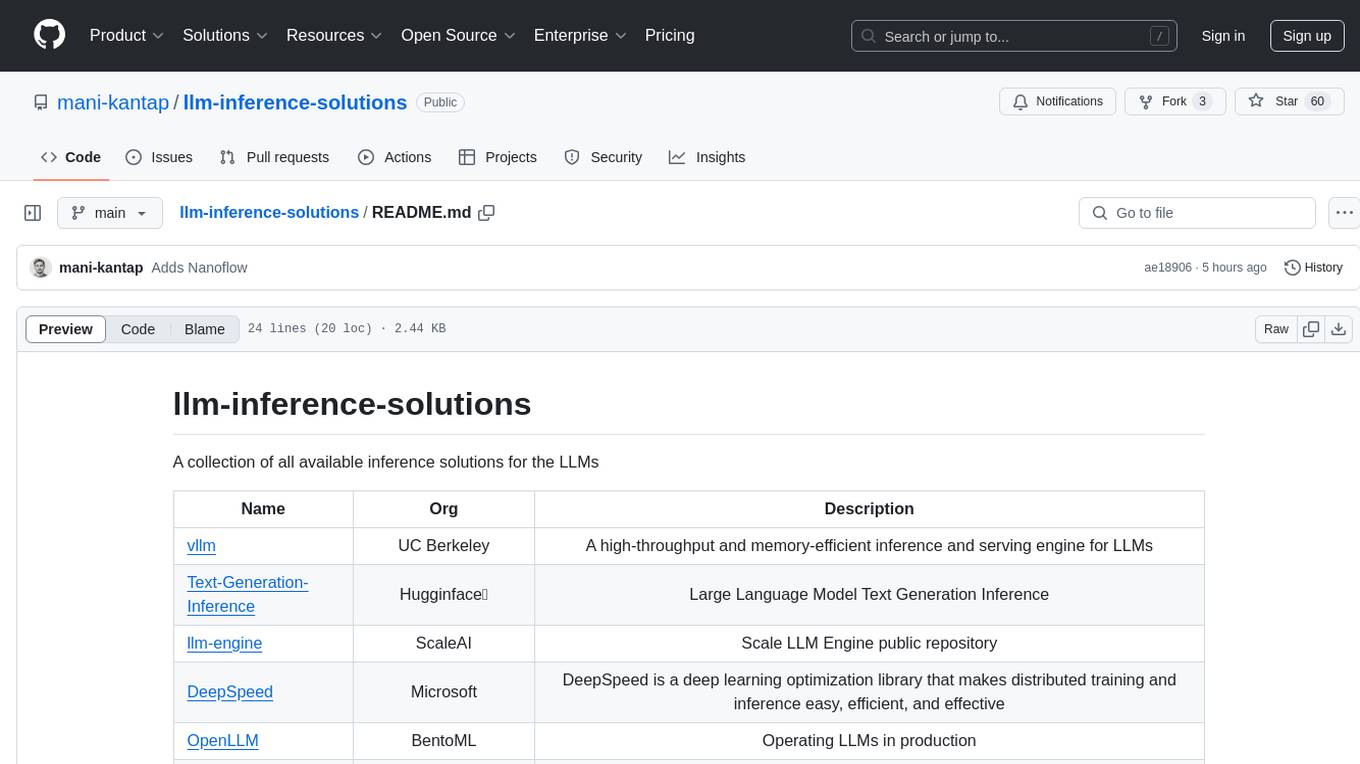
llm-inference-solutions
A collection of available inference solutions for Large Language Models (LLMs) including high-throughput engines, optimization libraries, deployment toolkits, and deep learning frameworks for production environments.
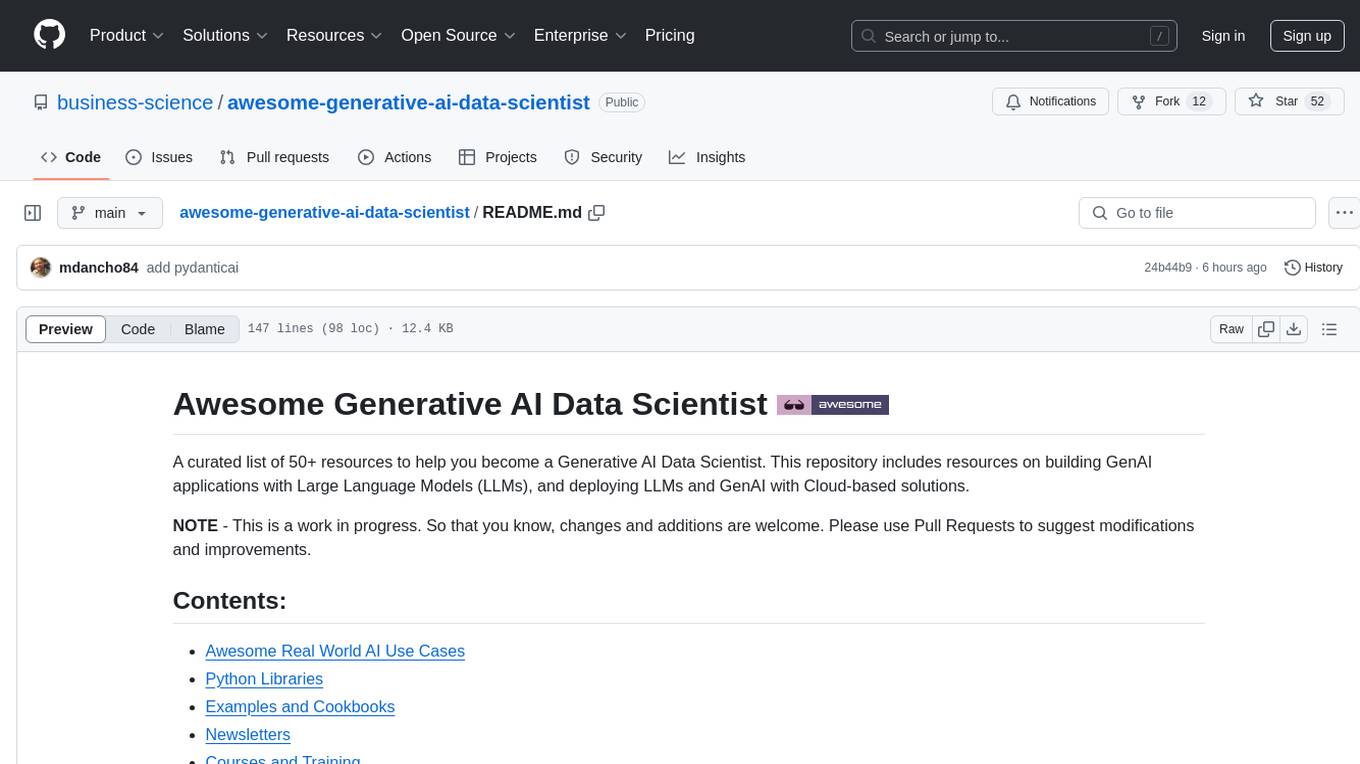
awesome-generative-ai-data-scientist
A curated list of 50+ resources to help you become a Generative AI Data Scientist. This repository includes resources on building GenAI applications with Large Language Models (LLMs), and deploying LLMs and GenAI with Cloud-based solutions.
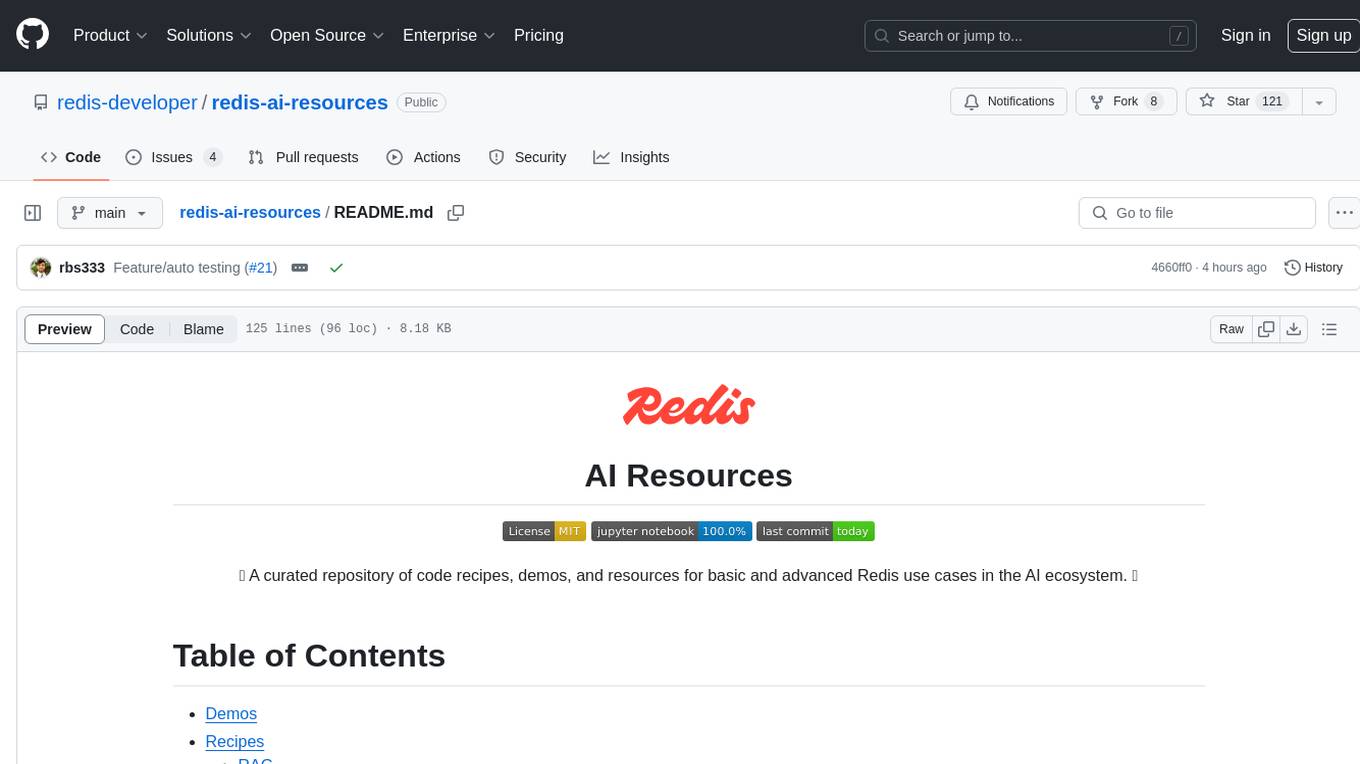
redis-ai-resources
A curated repository of code recipes, demos, and resources for basic and advanced Redis use cases in the AI ecosystem. It includes demos for ArxivChatGuru, Redis VSS, Vertex AI & Redis, Agentic RAG, ArXiv Search, and Product Search. Recipes cover topics like Getting started with RAG, Semantic Cache, Advanced RAG, and Recommendation systems. The repository also provides integrations/tools like RedisVL, AWS Bedrock, LangChain Python, LangChain JS, LlamaIndex, Semantic Kernel, RelevanceAI, and DocArray. Additional content includes blog posts, talks, reviews, and documentation related to Vector Similarity Search, AI-Powered Document Search, Vector Databases, Real-Time Product Recommendations, and more. Benchmarks compare Redis against other Vector Databases and ANN benchmarks. Documentation includes QuickStart guides, official literature for Vector Similarity Search, Redis-py client library docs, Redis Stack documentation, and Redis client list.
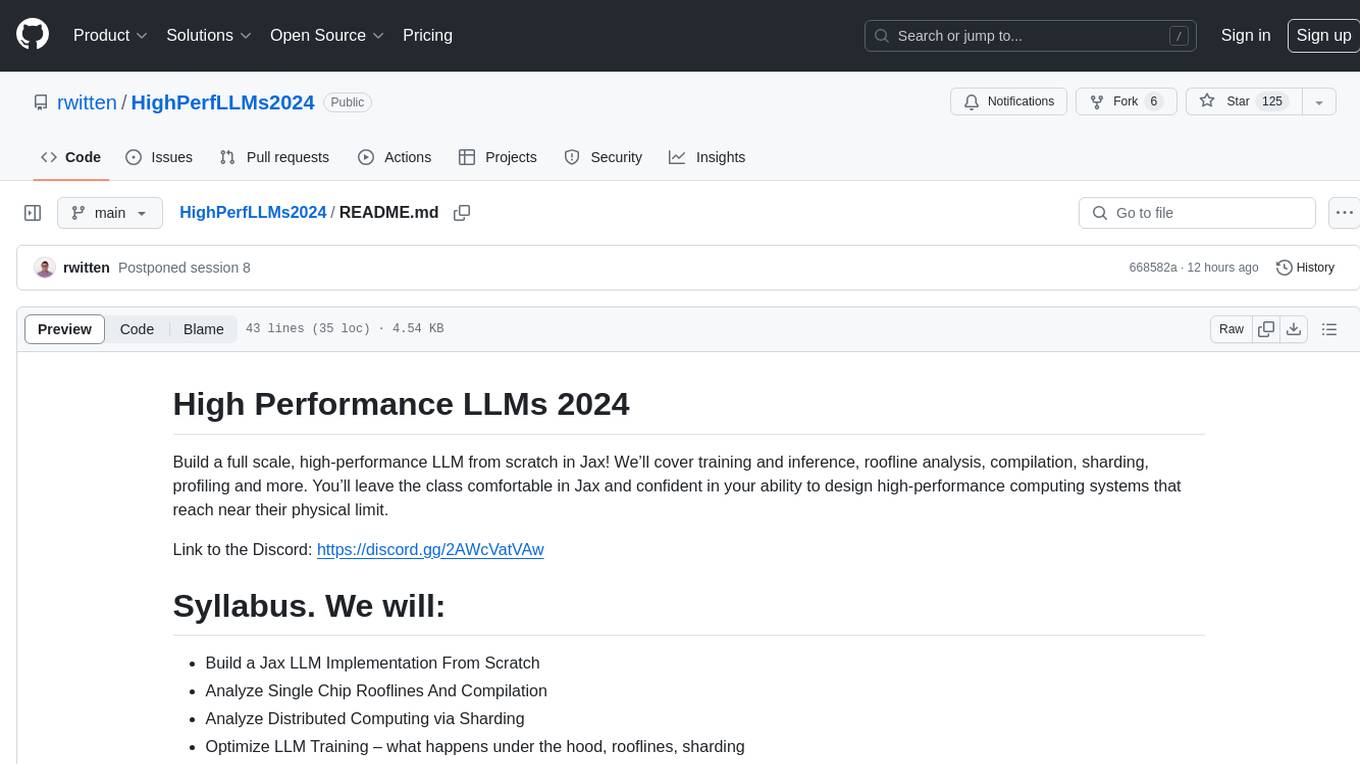
HighPerfLLMs2024
High Performance LLMs 2024 is a comprehensive course focused on building a high-performance Large Language Model (LLM) from scratch using Jax. The course covers various aspects such as training, inference, roofline analysis, compilation, sharding, profiling, and optimization techniques. Participants will gain a deep understanding of Jax and learn how to design high-performance computing systems that operate close to their physical limits.
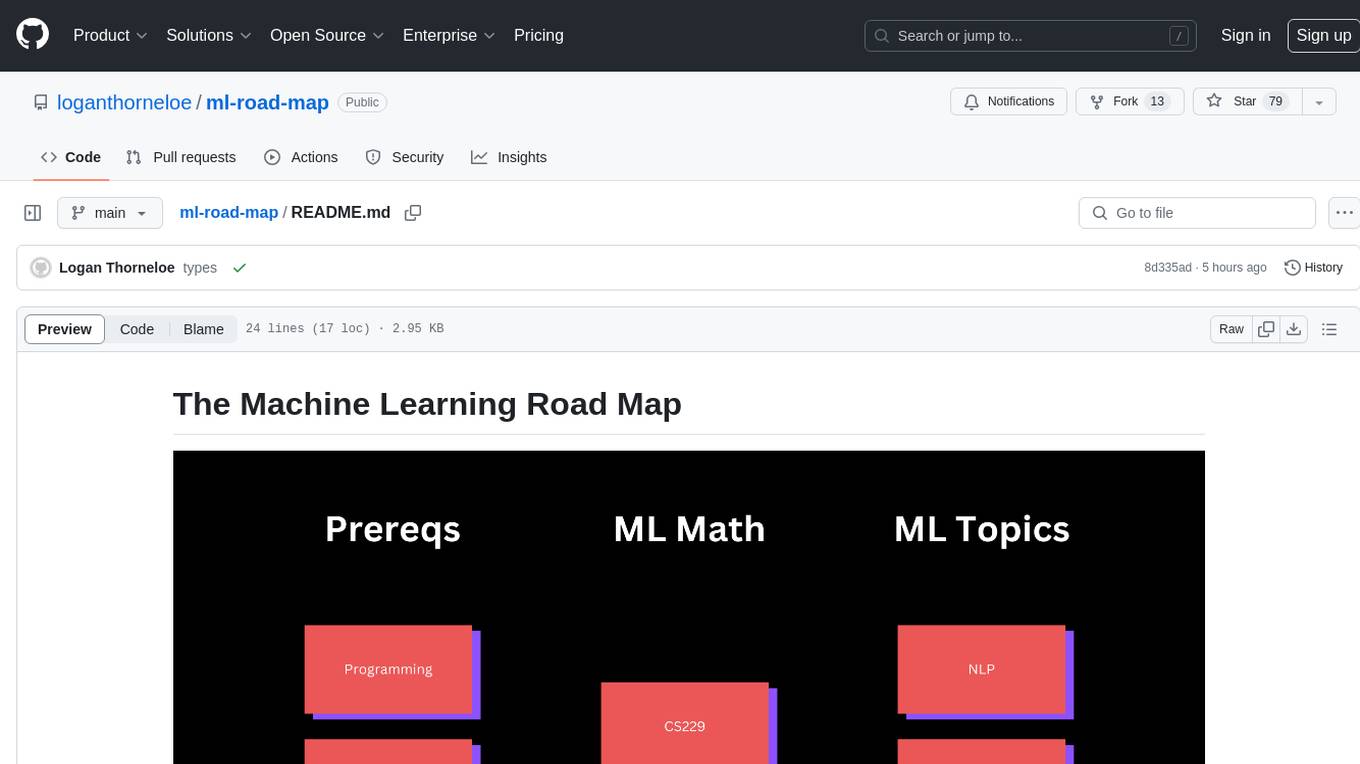
ml-road-map
The Machine Learning Road Map is a comprehensive guide designed to take individuals from various levels of machine learning knowledge to a basic understanding of machine learning principles using high-quality, free resources. It aims to simplify the complex and rapidly growing field of machine learning by providing a structured roadmap for learning. The guide emphasizes the importance of understanding AI for everyone, the need for patience in learning machine learning due to its complexity, and the value of learning from experts in the field. It covers five different paths to learning about machine learning, catering to consumers, aspiring AI researchers, ML engineers, developers interested in building ML applications, and companies looking to implement AI solutions.
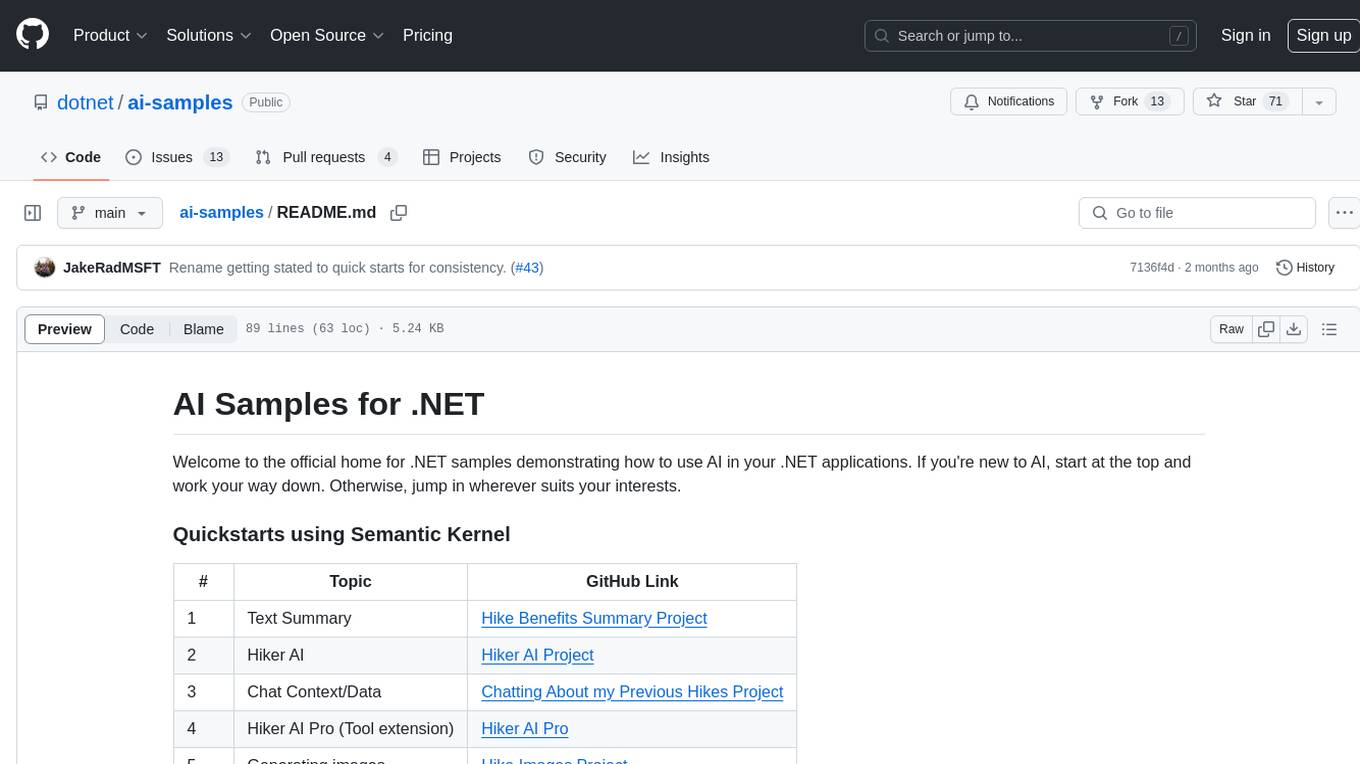
ai-samples
AI Samples for .NET is a repository containing various samples demonstrating how to use AI in .NET applications. It provides quickstarts using Semantic Kernel and Azure OpenAI SDK, covers LLM Core Concepts, End to End Examples, Local Models, Local Embedding Models, Tokenizers, Vector Databases, and Reference Examples. The repository showcases different AI-related projects and tools for developers to explore and learn from.
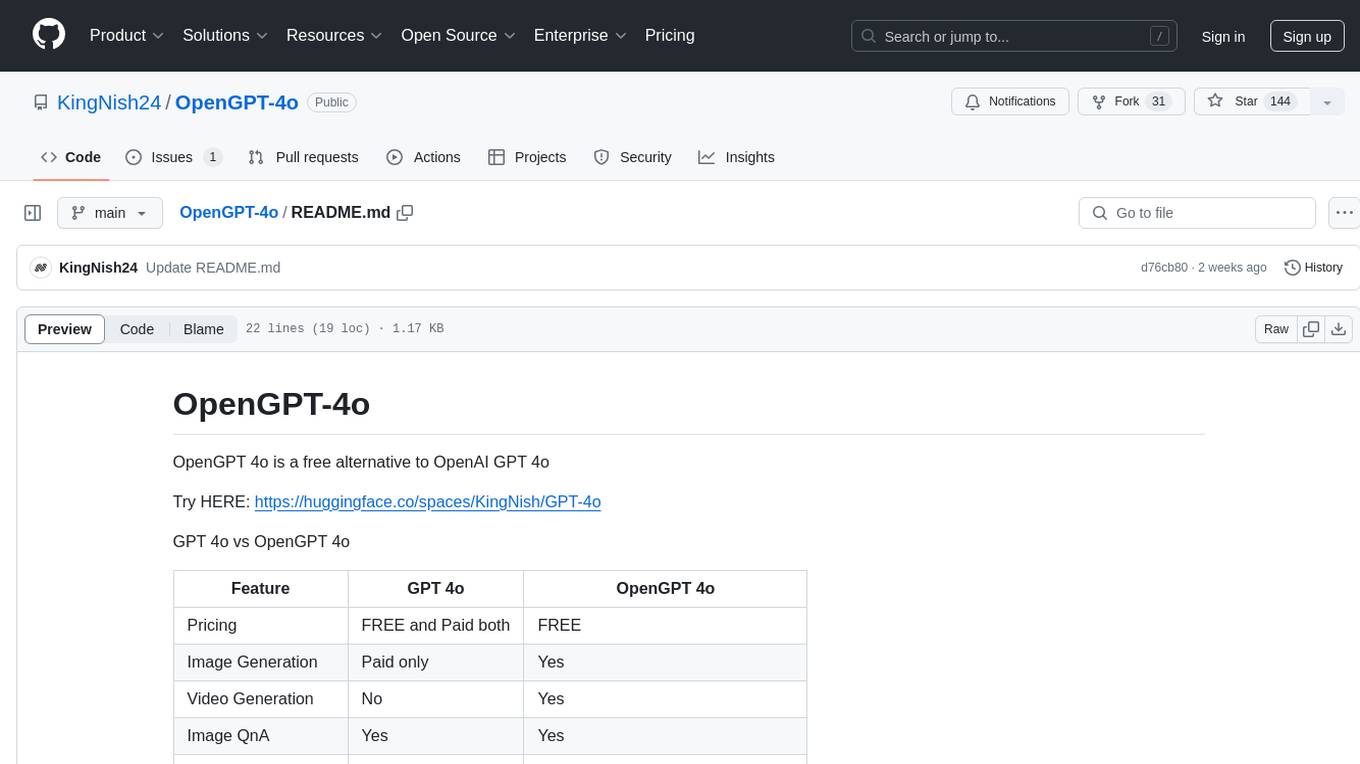
OpenGPT-4o
OpenGPT 4o is a free alternative to OpenAI GPT 4o. It offers various features such as free pricing, image and video generation, image QnA, voice and video chat, multilingual support, high customization, and continuous learning capability. The tool aims to provide an alternative to OpenAI GPT 4o with enhanced capabilities and features for users.
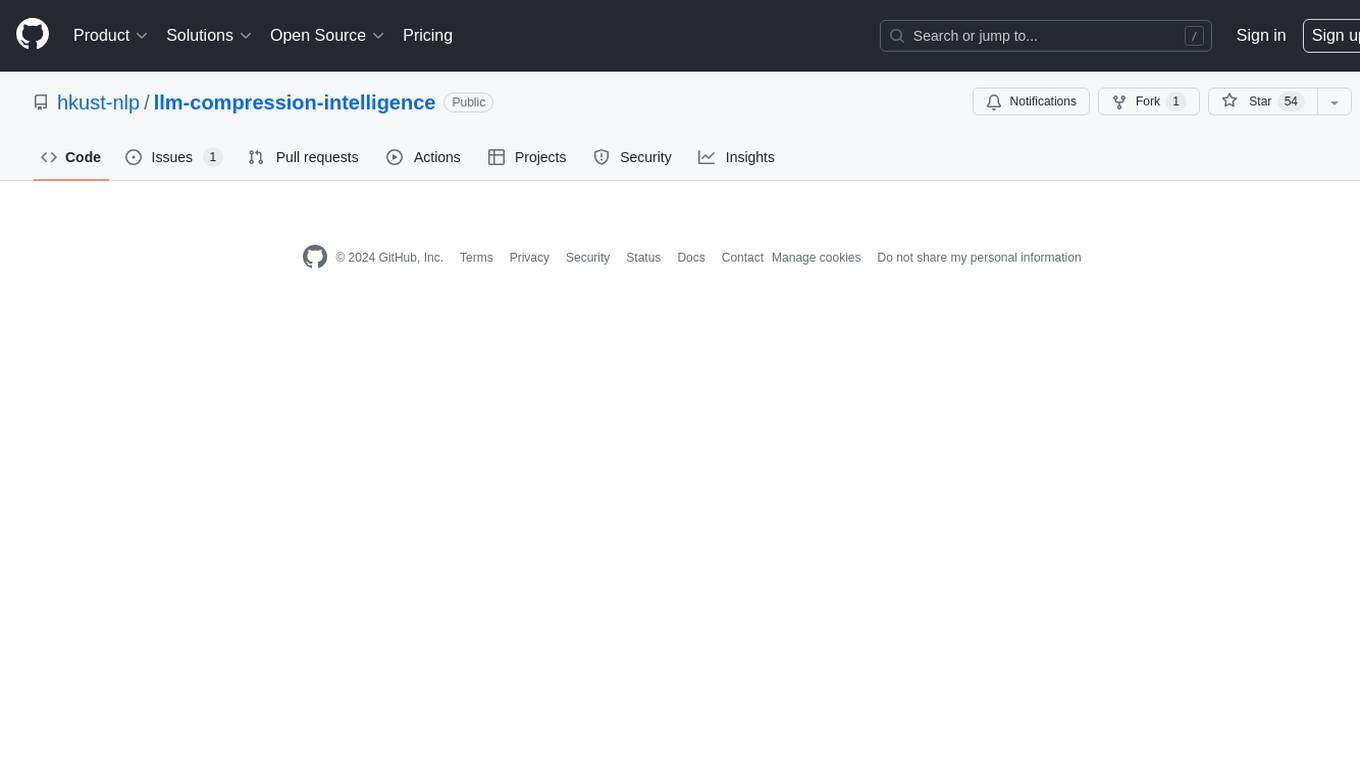
llm-compression-intelligence
This repository presents the findings of the paper "Compression Represents Intelligence Linearly". The study reveals a strong linear correlation between the intelligence of LLMs, as measured by benchmark scores, and their ability to compress external text corpora. Compression efficiency, derived from raw text corpora, serves as a reliable evaluation metric that is linearly associated with model capabilities. The repository includes the compression corpora used in the paper, code for computing compression efficiency, and data collection and processing pipelines.
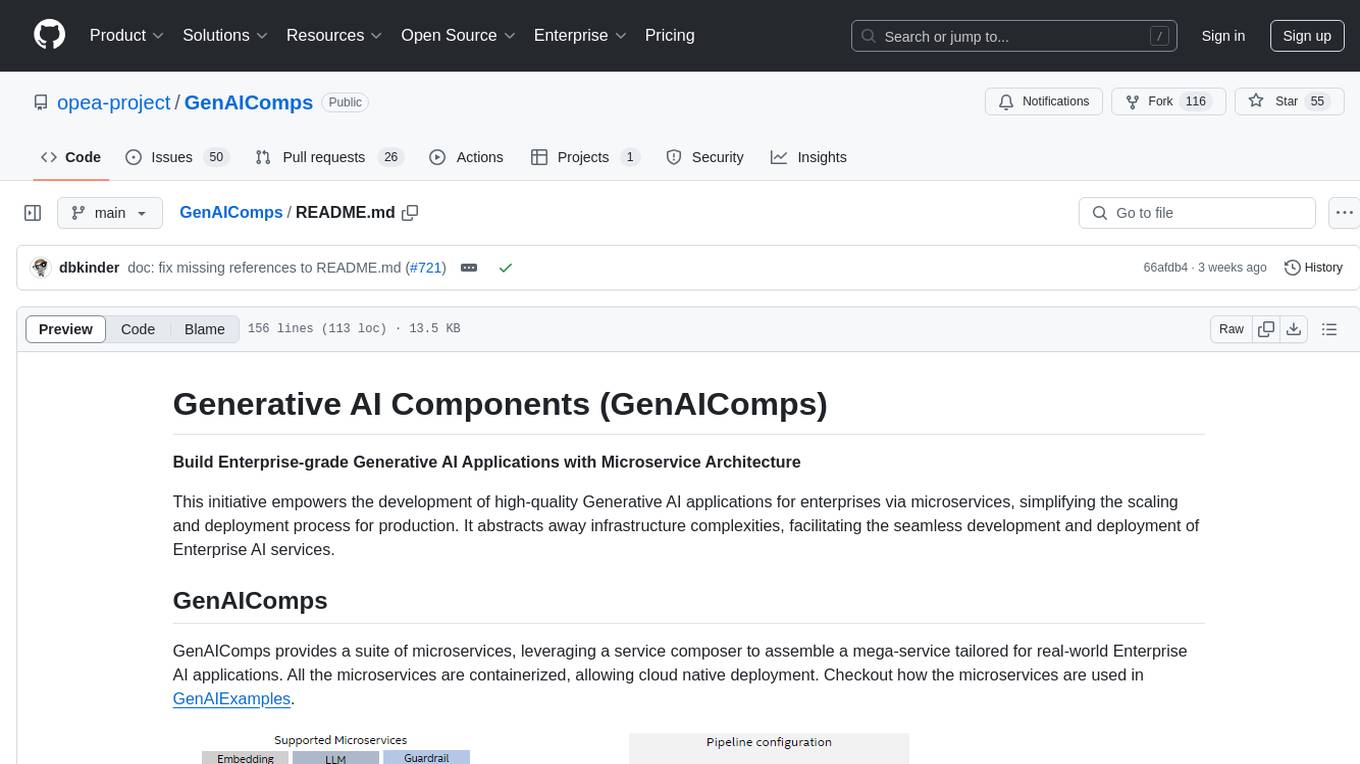
GenAIComps
GenAIComps is an initiative aimed at building enterprise-grade Generative AI applications using a microservice architecture. It simplifies the scaling and deployment process for production, abstracting away infrastructure complexities. GenAIComps provides a suite of containerized microservices that can be assembled into a mega-service tailored for real-world Enterprise AI applications. The modular approach of microservices allows for independent development, deployment, and scaling of individual components, promoting modularity, flexibility, and scalability. The mega-service orchestrates multiple microservices to deliver comprehensive solutions, encapsulating complex business logic and workflow orchestration. The gateway serves as the interface for users to access the mega-service, providing customized access based on user requirements.
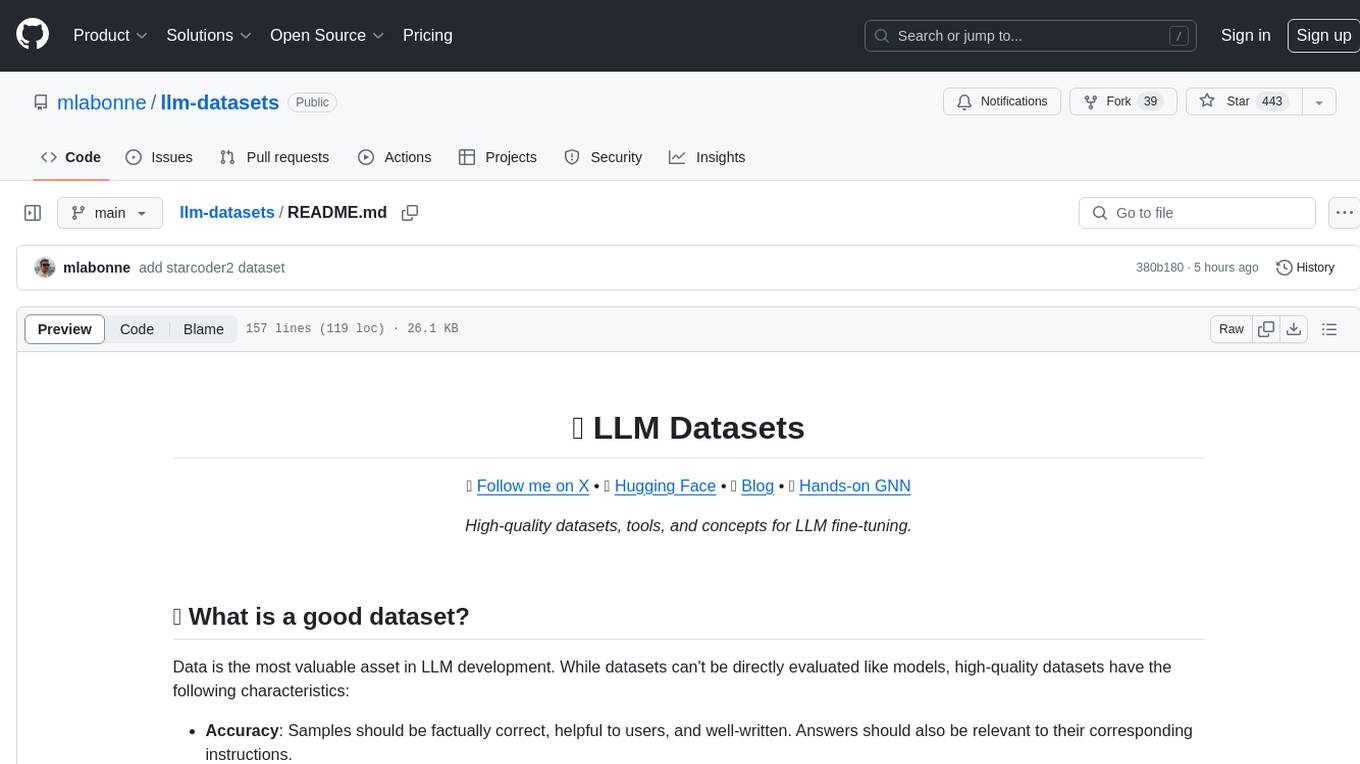
llm-datasets
LLM Datasets is a repository containing high-quality datasets, tools, and concepts for LLM fine-tuning. It provides datasets with characteristics like accuracy, diversity, and complexity to train large language models for various tasks. The repository includes datasets for general-purpose, math & logic, code, conversation & role-play, and agent & function calling domains. It also offers guidance on creating high-quality datasets through data deduplication, data quality assessment, data exploration, and data generation techniques.
For similar tasks

qdrant
Qdrant is a vector similarity search engine and vector database. It is written in Rust, which makes it fast and reliable even under high load. Qdrant can be used for a variety of applications, including: * Semantic search * Image search * Product recommendations * Chatbots * Anomaly detection Qdrant offers a variety of features, including: * Payload storage and filtering * Hybrid search with sparse vectors * Vector quantization and on-disk storage * Distributed deployment * Highlighted features such as query planning, payload indexes, SIMD hardware acceleration, async I/O, and write-ahead logging Qdrant is available as a fully managed cloud service or as an open-source software that can be deployed on-premises.
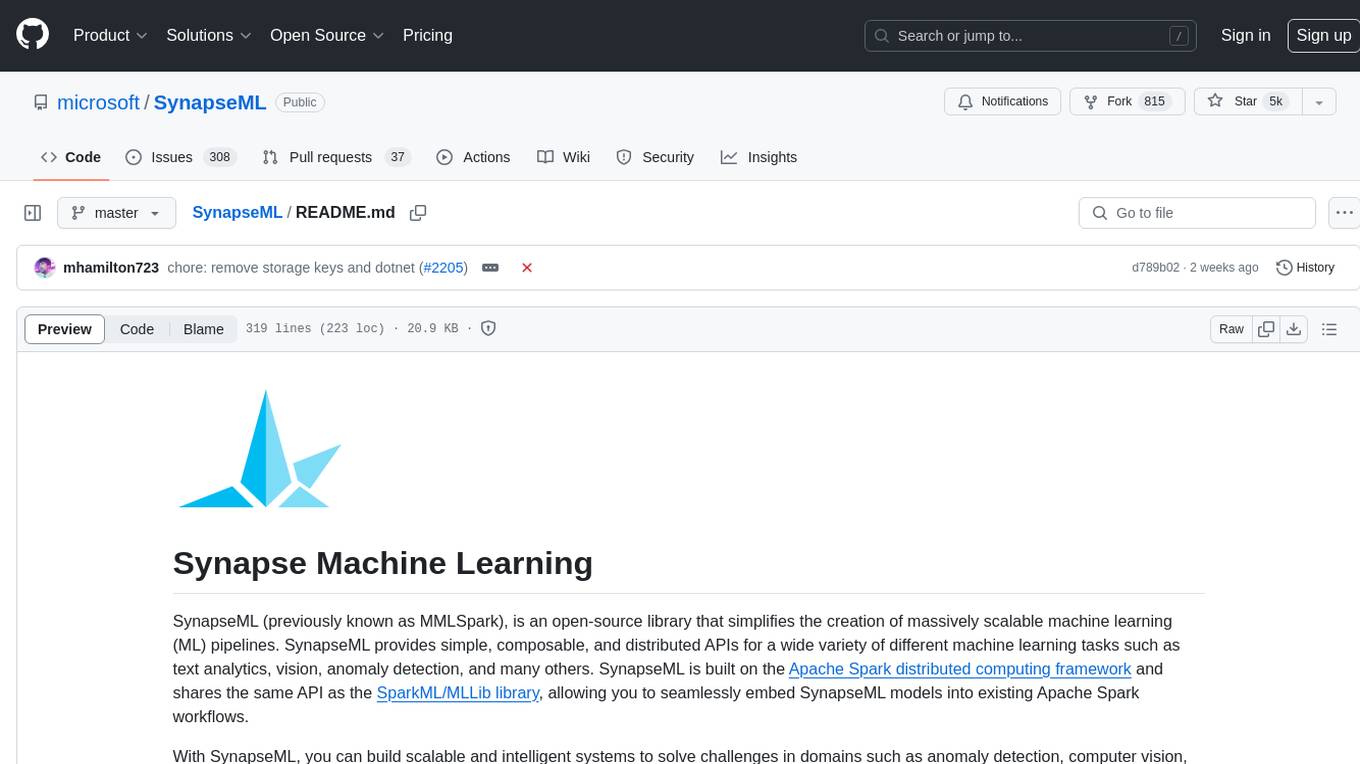
SynapseML
SynapseML (previously known as MMLSpark) is an open-source library that simplifies the creation of massively scalable machine learning (ML) pipelines. It provides simple, composable, and distributed APIs for various machine learning tasks such as text analytics, vision, anomaly detection, and more. Built on Apache Spark, SynapseML allows seamless integration of models into existing workflows. It supports training and evaluation on single-node, multi-node, and resizable clusters, enabling scalability without resource wastage. Compatible with Python, R, Scala, Java, and .NET, SynapseML abstracts over different data sources for easy experimentation. Requires Scala 2.12, Spark 3.4+, and Python 3.8+.
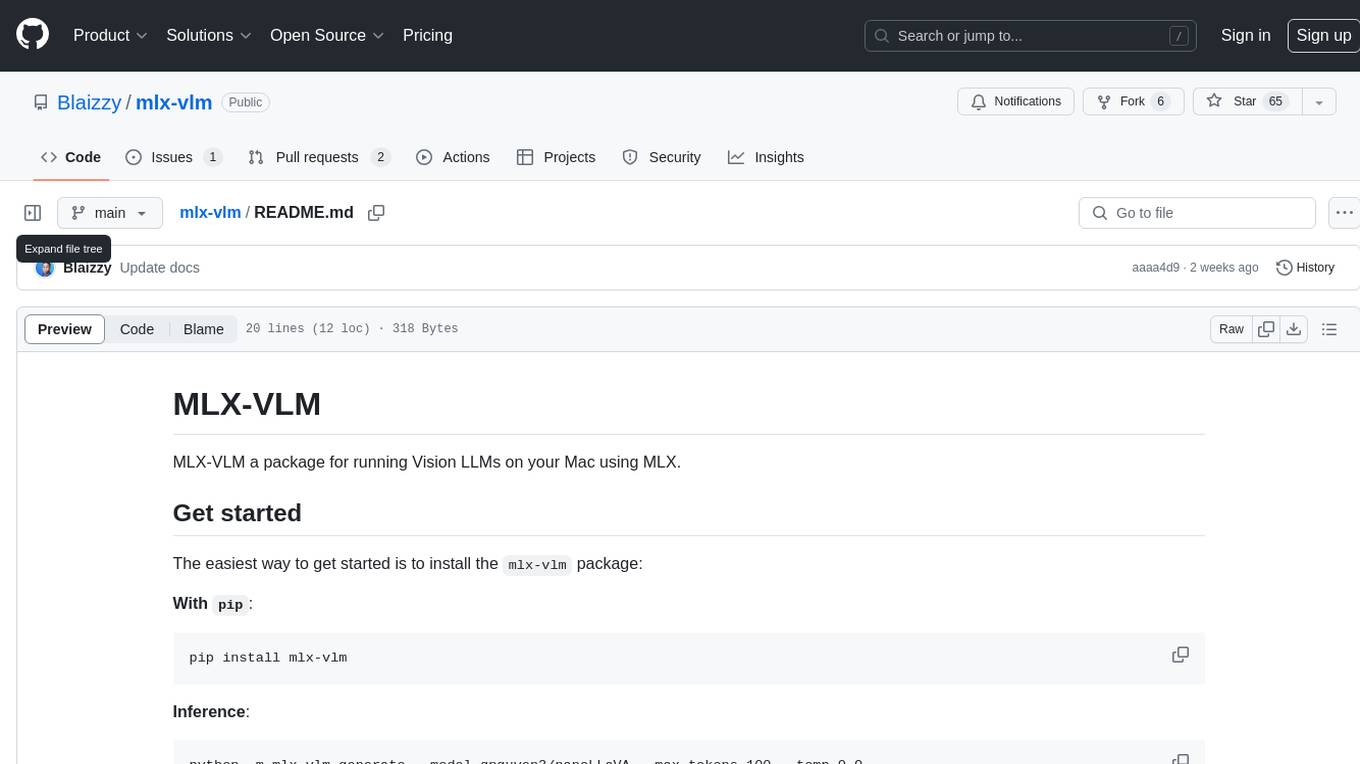
mlx-vlm
MLX-VLM is a package designed for running Vision LLMs on Mac systems using MLX. It provides a convenient way to install and utilize the package for processing large language models related to vision tasks. The tool simplifies the process of running LLMs on Mac computers, offering a seamless experience for users interested in leveraging MLX for vision-related projects.
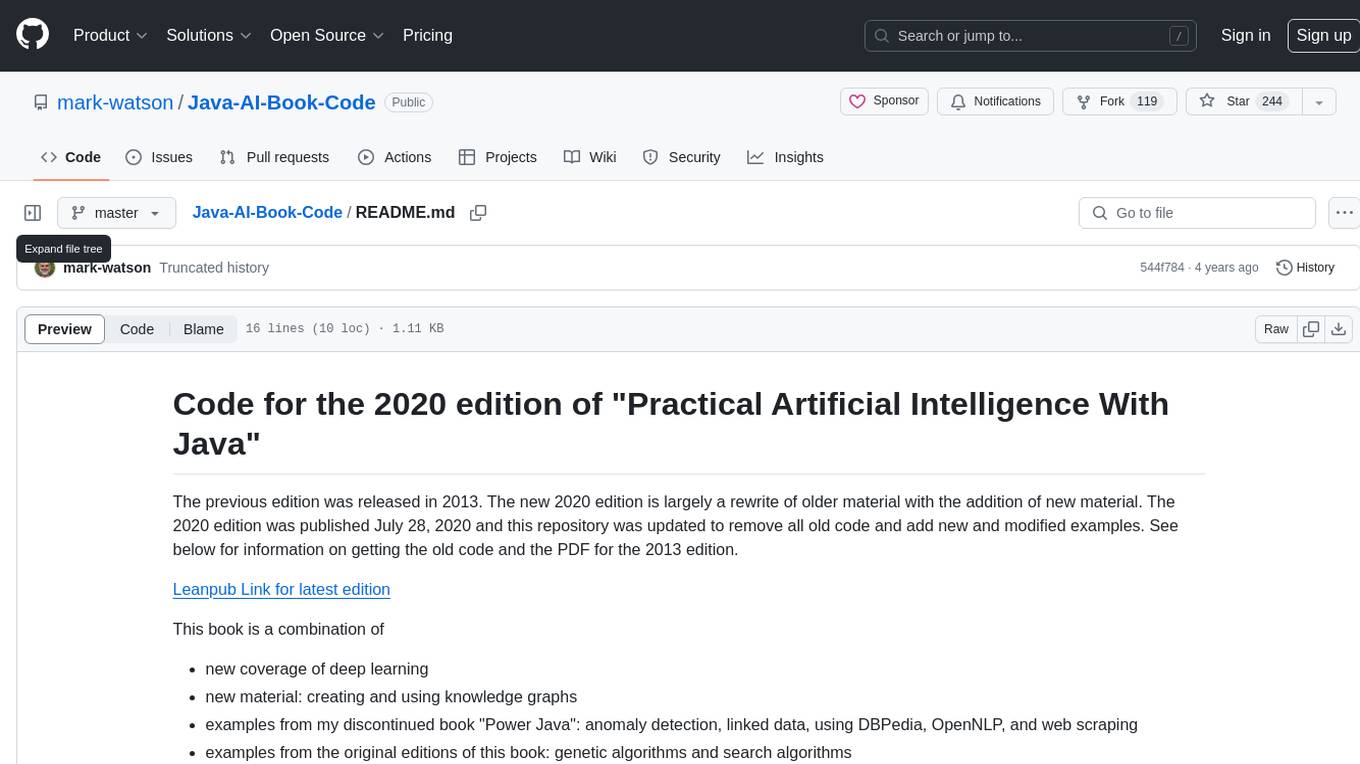
Java-AI-Book-Code
The Java-AI-Book-Code repository contains code examples for the 2020 edition of 'Practical Artificial Intelligence With Java'. It is a comprehensive update of the previous 2013 edition, featuring new content on deep learning, knowledge graphs, anomaly detection, linked data, genetic algorithms, search algorithms, and more. The repository serves as a valuable resource for Java developers interested in AI applications and provides practical implementations of various AI techniques and algorithms.
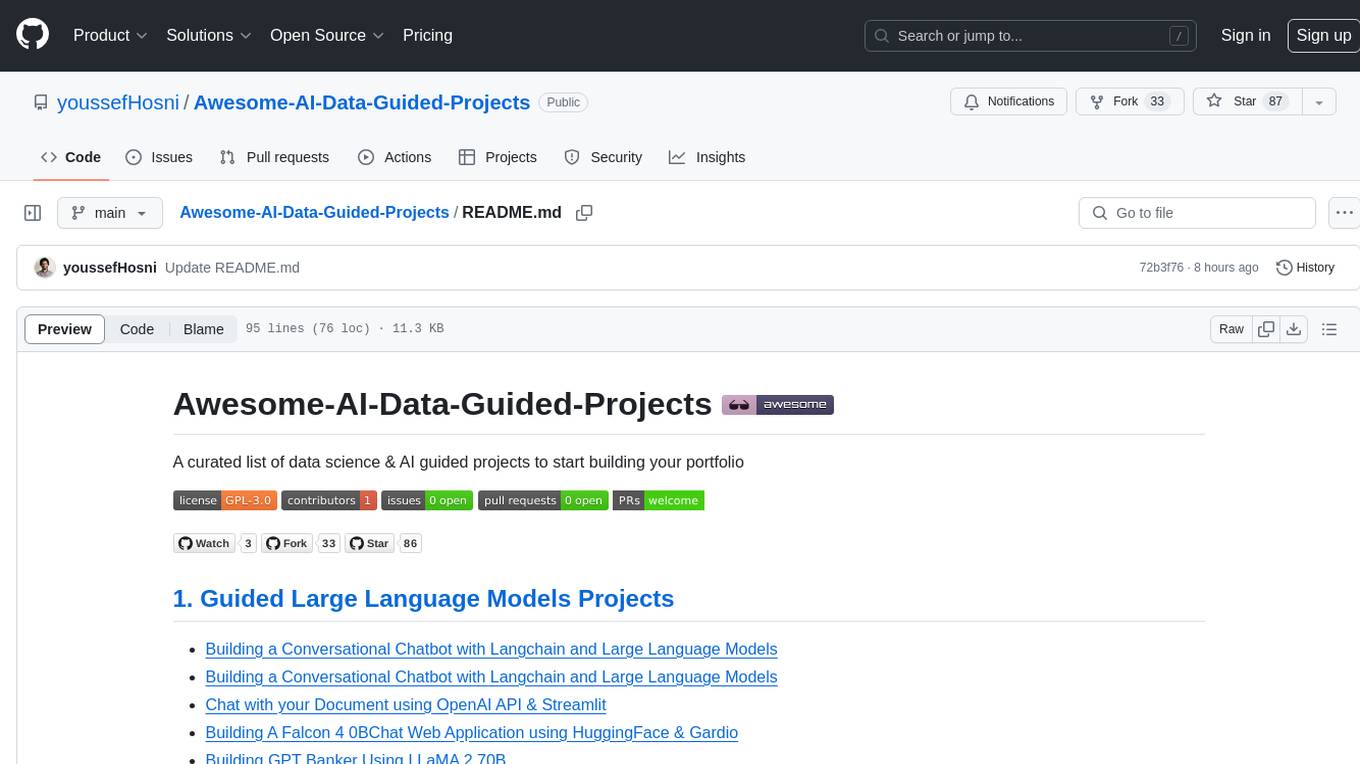
Awesome-AI-Data-Guided-Projects
A curated list of data science & AI guided projects to start building your portfolio. The repository contains guided projects covering various topics such as large language models, time series analysis, computer vision, natural language processing (NLP), and data science. Each project provides detailed instructions on how to implement specific tasks using different tools and technologies.
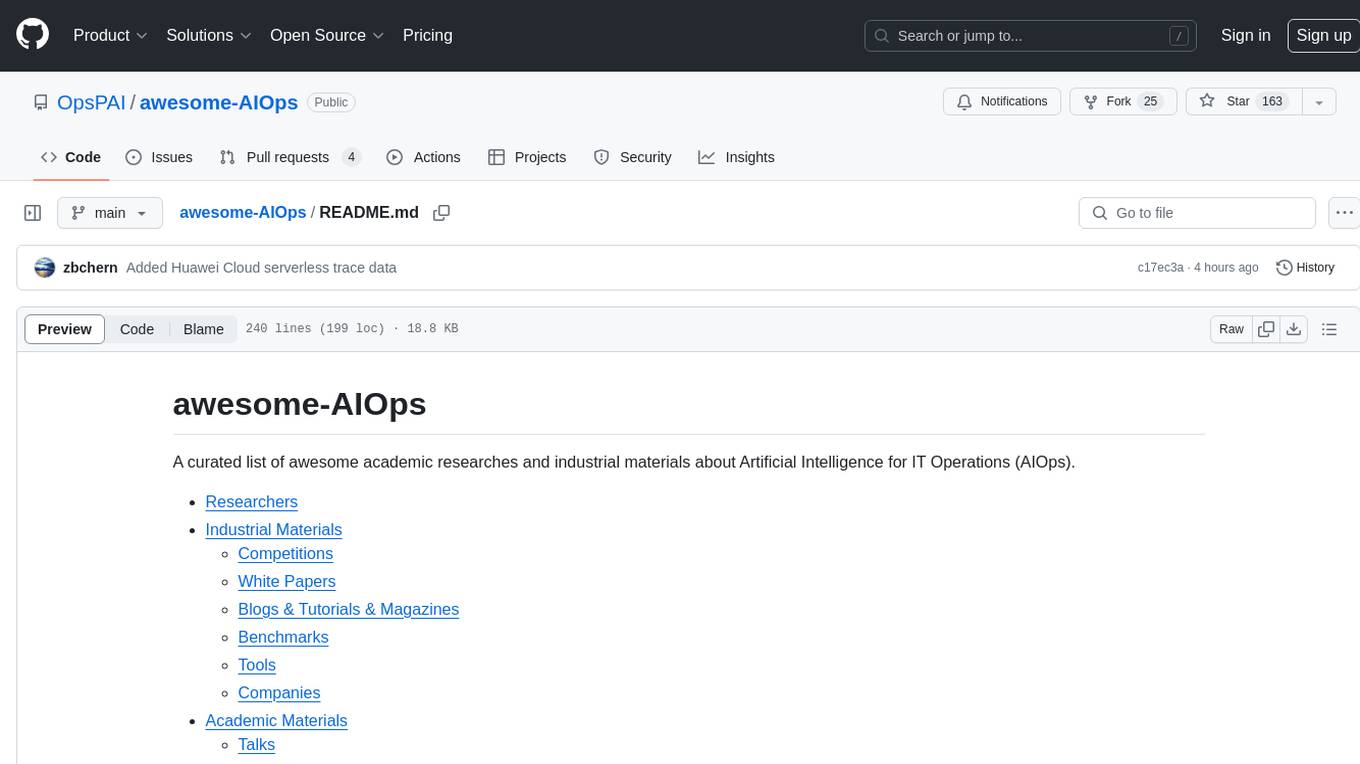
awesome-AIOps
awesome-AIOps is a curated list of academic researches and industrial materials related to Artificial Intelligence for IT Operations (AIOps). It includes resources such as competitions, white papers, blogs, tutorials, benchmarks, tools, companies, academic materials, talks, workshops, papers, and courses covering various aspects of AIOps like anomaly detection, root cause analysis, incident management, microservices, dependency tracing, and more.
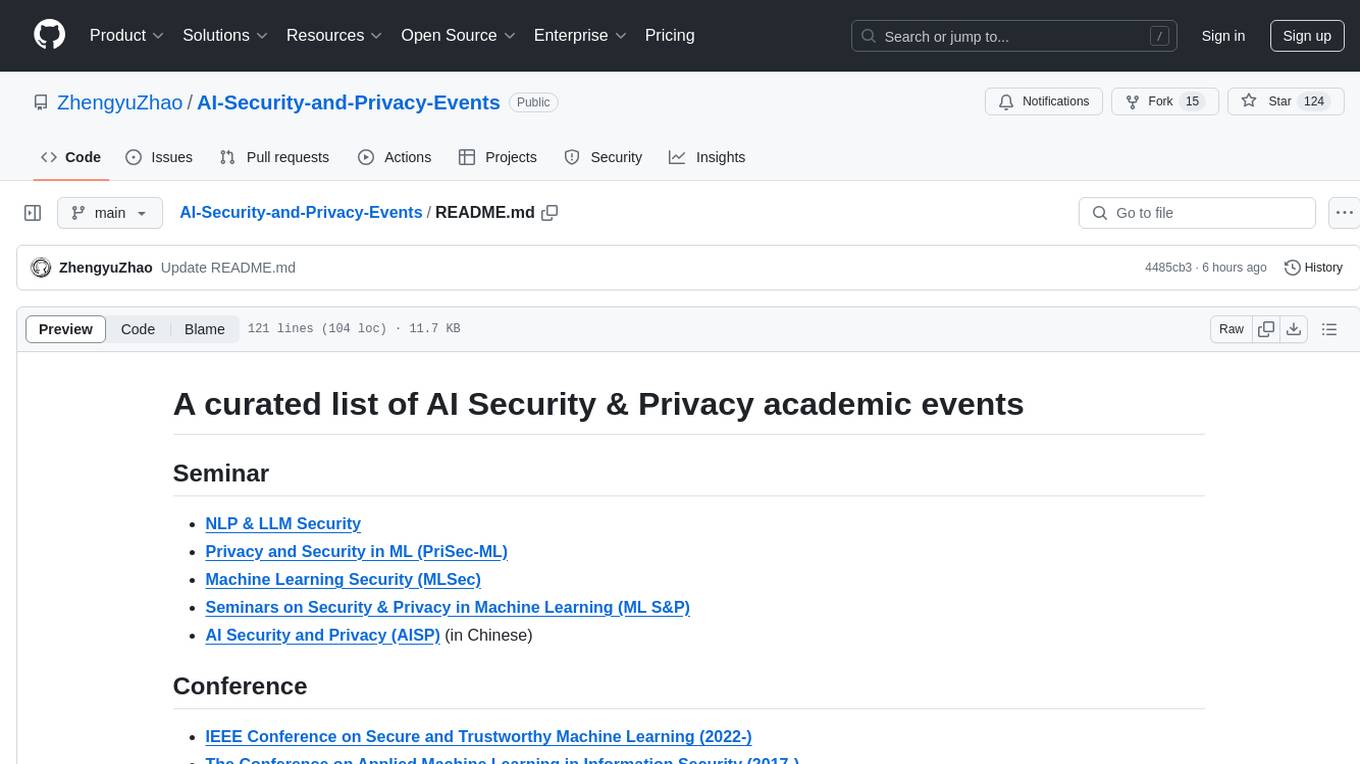
AI-Security-and-Privacy-Events
AI-Security-and-Privacy-Events is a curated list of academic events focusing on AI security and privacy. It includes seminars, conferences, workshops, tutorials, special sessions, and covers various topics such as NLP & LLM Security, Privacy and Security in ML, Machine Learning Security, AI System with Confidential Computing, Adversarial Machine Learning, and more.
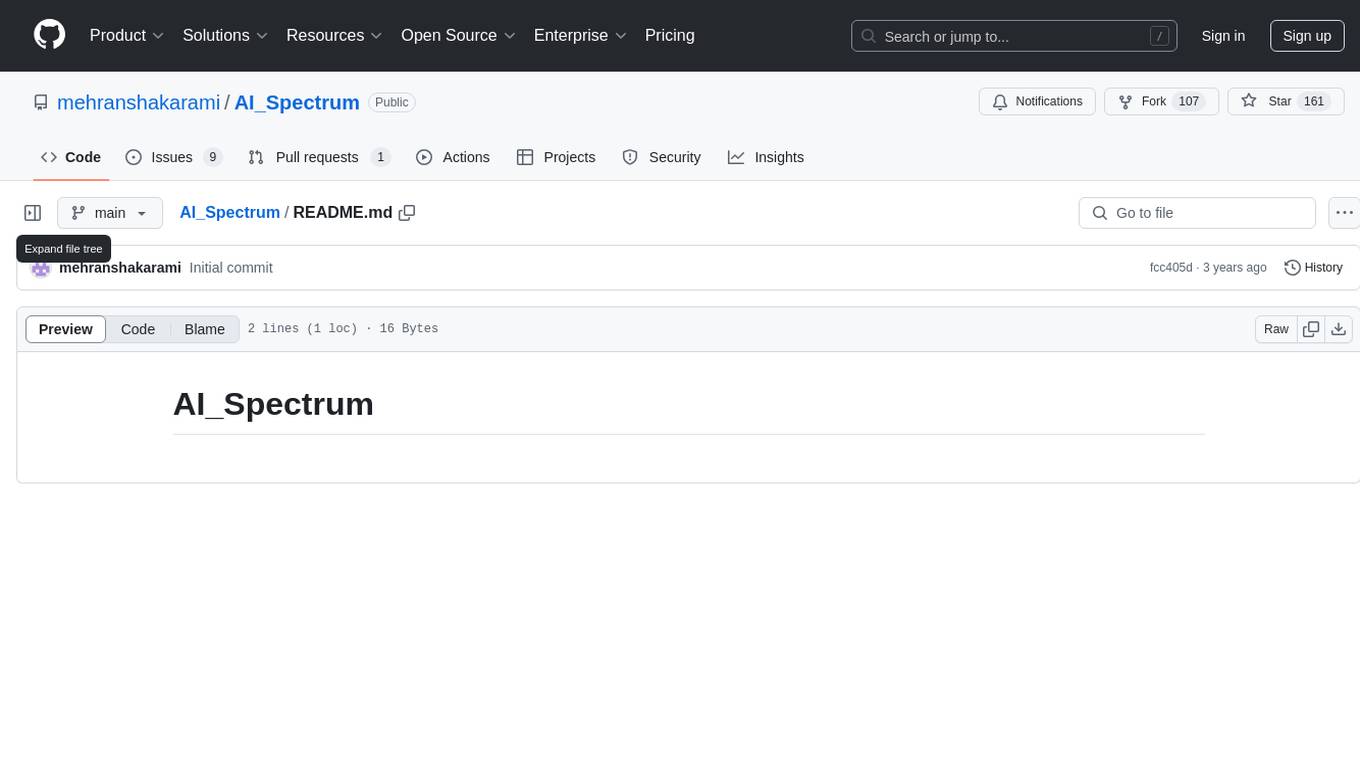
AI_Spectrum
AI_Spectrum is a versatile machine learning library that provides a wide range of tools and algorithms for building and deploying AI models. It offers a user-friendly interface for data preprocessing, model training, and evaluation. With AI_Spectrum, users can easily experiment with different machine learning techniques and optimize their models for various tasks. The library is designed to be flexible and scalable, making it suitable for both beginners and experienced data scientists.
For similar jobs

sweep
Sweep is an AI junior developer that turns bugs and feature requests into code changes. It automatically handles developer experience improvements like adding type hints and improving test coverage.

teams-ai
The Teams AI Library is a software development kit (SDK) that helps developers create bots that can interact with Teams and Microsoft 365 applications. It is built on top of the Bot Framework SDK and simplifies the process of developing bots that interact with Teams' artificial intelligence capabilities. The SDK is available for JavaScript/TypeScript, .NET, and Python.

ai-guide
This guide is dedicated to Large Language Models (LLMs) that you can run on your home computer. It assumes your PC is a lower-end, non-gaming setup.

classifai
Supercharge WordPress Content Workflows and Engagement with Artificial Intelligence. Tap into leading cloud-based services like OpenAI, Microsoft Azure AI, Google Gemini and IBM Watson to augment your WordPress-powered websites. Publish content faster while improving SEO performance and increasing audience engagement. ClassifAI integrates Artificial Intelligence and Machine Learning technologies to lighten your workload and eliminate tedious tasks, giving you more time to create original content that matters.

chatbot-ui
Chatbot UI is an open-source AI chat app that allows users to create and deploy their own AI chatbots. It is easy to use and can be customized to fit any need. Chatbot UI is perfect for businesses, developers, and anyone who wants to create a chatbot.

BricksLLM
BricksLLM is a cloud native AI gateway written in Go. Currently, it provides native support for OpenAI, Anthropic, Azure OpenAI and vLLM. BricksLLM aims to provide enterprise level infrastructure that can power any LLM production use cases. Here are some use cases for BricksLLM: * Set LLM usage limits for users on different pricing tiers * Track LLM usage on a per user and per organization basis * Block or redact requests containing PIIs * Improve LLM reliability with failovers, retries and caching * Distribute API keys with rate limits and cost limits for internal development/production use cases * Distribute API keys with rate limits and cost limits for students

uAgents
uAgents is a Python library developed by Fetch.ai that allows for the creation of autonomous AI agents. These agents can perform various tasks on a schedule or take action on various events. uAgents are easy to create and manage, and they are connected to a fast-growing network of other uAgents. They are also secure, with cryptographically secured messages and wallets.

griptape
Griptape is a modular Python framework for building AI-powered applications that securely connect to your enterprise data and APIs. It offers developers the ability to maintain control and flexibility at every step. Griptape's core components include Structures (Agents, Pipelines, and Workflows), Tasks, Tools, Memory (Conversation Memory, Task Memory, and Meta Memory), Drivers (Prompt and Embedding Drivers, Vector Store Drivers, Image Generation Drivers, Image Query Drivers, SQL Drivers, Web Scraper Drivers, and Conversation Memory Drivers), Engines (Query Engines, Extraction Engines, Summary Engines, Image Generation Engines, and Image Query Engines), and additional components (Rulesets, Loaders, Artifacts, Chunkers, and Tokenizers). Griptape enables developers to create AI-powered applications with ease and efficiency.
